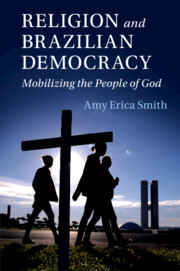Book contents
- Religion and Brazilian Democracy
- Cambridge Studies in Social Theory, Religion, and Politics
- Religion and Brazilian Democracy
- Copyright page
- Dedication
- Contents
- Figures
- Tables
- Acknowledgments
- Part I Introduction
- Part II What Clergy Think, Say, and Do
- Part III How Congregants Respond
- Part IV Representation
- 9 The Representational Triangle
- 10 Conclusion: Mobilizing the People of God
- Afterword
- Book part
- References
- Index
- Books in the Series (continued from p. ii)
10 - Conclusion: Mobilizing the People of God
from Part IV - Representation
Published online by Cambridge University Press: 15 March 2019
- Religion and Brazilian Democracy
- Cambridge Studies in Social Theory, Religion, and Politics
- Religion and Brazilian Democracy
- Copyright page
- Dedication
- Contents
- Figures
- Tables
- Acknowledgments
- Part I Introduction
- Part II What Clergy Think, Say, and Do
- Part III How Congregants Respond
- Part IV Representation
- 9 The Representational Triangle
- 10 Conclusion: Mobilizing the People of God
- Afterword
- Book part
- References
- Index
- Books in the Series (continued from p. ii)
Summary
- Type
- Chapter
- Information
- Religion and Brazilian DemocracyMobilizing the People of God, pp. 162 - 175Publisher: Cambridge University PressPrint publication year: 2019



